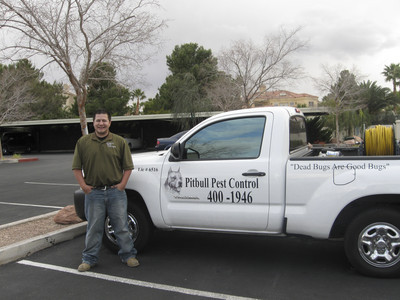Pests venture indoors seeking food, shelter

The weather outside is cold and sometimes rainy. You’d like nothing more than to cozy up to a warm fire with your favorite beverage and a good book.
Unfortunately, you’re not alone.
Insects, rodents and other pests want to be inside where it’s warm and cozy just like we do, said Greg Baumann, senior scientist and vice president of technical services for the National Pest Management Association.
Once inside, these pests can spread disease, contaminate food sources and cause serious damage to a home’s structure. But with a little bit of work, some expert advice and professional help, you can create a pest-free environment.
"Houses are under pest pressure year-round. What we try to do is modify their habitats a bit," Baumann said.
In order to survive, pests need three basic things: food, water and harborage. "If they’re infesting dog food, for example, they’re getting food. If you have a leaky pipe, there’s water. And if you have cracks around the windows or in your siding, they have harborage. What you want to do is remove as many of the three things as possible," he said.
The place to start is by taking a walk around your home to look for cracks. Baumann said a rodent can get through anything that a pencil can fit into. He also warns against leaving any type of door open, including garage doors or front doors — even for 10 minutes while you’re carrying in groceries.
"Just imagine the size of that hole you’re leaving open for wildlife," he said.
This includes rodents, which are especially active during the colder winters, said Kelly Dunn, office manager for Pitbull Pest Control in Las Vegas.
Another common problem this time of year is pantry pests. Baumann said this stems from the flour sitting in paper sacks in the pantry that people bought because it was on sale and they anticipated doing lots of baking around the holidays but got busy and didn’t bake as much as they planned.
"Any type of flour or cereal-based product should go in a plastic container," he said. "If something is infested, it will infest other goods. If it’s in a plastic container, you don’t have that problem."
In addition to basic vigilance, Baumann said it is vital that homeowners remain aware of what is going on around their homes. If they see a problem, they should seek professional help. Professional pest control firms can identify the pest and then use the proper method to eradicate it.
"A (pest control) professional doesn’t sell a product other than knowledge. They are trained and experienced, and that brings a lot to the table," Baumann said.
"Although pest control has long been considered part of ‘spring cleaning,’ it can no longer be relegated to one season. Pest control must be viewed as a year-round commitment to protecting one’s property and a family’s health from the threats associated with pest damage and disease," he added.
Chance Romo, a pest control technician with Pitbull Pest Control in Las Vegas agrees.
"Most pests are not that active in the winter; it’s more preventative maintenance," he said.
Still, because of the area’s mild climate, pests such as ants and roaches are a problem all year.
"Bugs are here year-round; they’re not prejudiced against the weather," Dunn said.
Because it recommends pest control services throughout the year, Pitbull has added organic pesticides to its arsenal of bug-fighting tools to help mitigate any adverse effects on the environment.
Using a wettable powder made out of chrysanthemums, rosemary and thyme, Romo said the organic pesticide, EcoPCO WPX, is just as effective as traditional chemical pesticides, lasts longer and it smells a whole lot better.
"It smells like mints," he said adding "my wife really like it when I use it at my house."
Currently, between 15 and 20 percent of Pitbull’s customers use the organic pesticide, which costs about $10 more a month than chemical pesticides.
Because it is safer on the environment and to pest control technicians’ health, both Romo and Dunn would like to see that number increase.
In addition to monthly service, Romo said homeowners should make sure the areas around their homes are kept clean and free of debris, which offers both a food source and refuge for pests. The interiors also should be kept clean, especially the kitchen. Romo said it’s not a good idea to let dirty dishes sit in the sink because they attract ants.
Additional information about pests and pest control options can be found at the National Pest Management Association’s Web site, www.pestworld.org.












